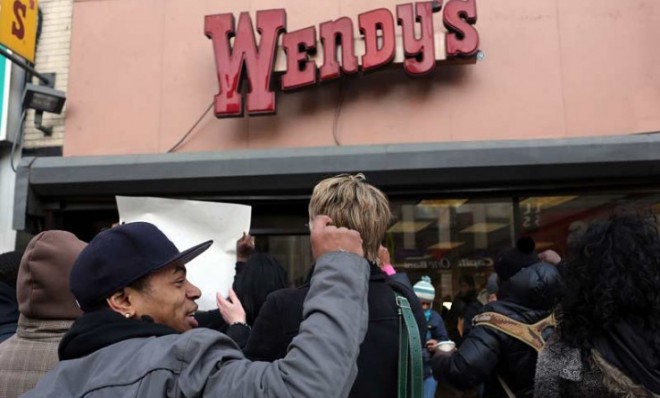Should fast-food workers be able to unionize?
Workers in New York City walk off the job at some of the country's biggest chains, demanding a living wage


A free daily email with the biggest news stories of the day – and the best features from TheWeek.com
You are now subscribed
Your newsletter sign-up was successful
On Thursday, fast-food workers at several nationwide chains in New York City said they were mad as hell and weren't going to take it anymore. They walked off the job, "firing the first salvo in what workplace experts say is the biggest effort to unionize fast-food workers ever undertaken in the United States," says Steven Greenhouse at The New York Times. The workers complain that McDonald's, Burger King, Kentucky Fried Chicken, Taco Bell, and others pay so little that they can barely afford food, clothing, transportation, and shelter. "It really is living in poverty," Raymond Lopez, a McDonald's employee, tells The Times.
The median hourly wage for fast-food workers in New York is $9, which for full-time workers comes to $18,500 a year, an especially meager amount given the city's high cost of living. The workers on strike are demanding an hourly wage of $15, as well as the right to form a union, which would ostensibly give them greater bargaining power with management. Organizers of the strike, which include civil rights groups, religious leaders, and a service-industry union, say it's the first time that workers from different fast-food companies have joined forces to make their demands known.
Supporters of the union drive say that the industry has changed, making wage raises imperative. "I don't think we can afford to write off fast food anymore as simply a sector that offers transitional jobs for teenagers," Annette Bernhardt, an official at the National Employment Law Project, tells The Atlantic. "Increasingly working families are depending on this industry, and unless we confront the serious problem of low wages in the fast food industry, we're not going to solve the job quality problem for the labor market as a whole."
The Week
Escape your echo chamber. Get the facts behind the news, plus analysis from multiple perspectives.

Sign up for The Week's Free Newsletters
From our morning news briefing to a weekly Good News Newsletter, get the best of The Week delivered directly to your inbox.
From our morning news briefing to a weekly Good News Newsletter, get the best of The Week delivered directly to your inbox.
Indeed, others say the problems in the fast-food industry reflect broader shifts in the modern economy, with companies increasingly relying on part-time work because it requires them to provide fewer benefits and protections for workers. And that inevitably leads more workers to rely on government health services and assistance — all of which gets paid for by the taxpayer, instead of large corporations.
The main argument against unionization is that it will compel companies to pass on costs to consumers. "The public wants what it wants when it wants it," says Douglas A. McIntyre at 24/7 Wall St. "Inexpensive food and services by retailers and restaurants are no exception." However, unlike Hostess, which recently was forced to enter liquidation after a crippling union strike, fast-food companies have made money hand over fist in the Great Recession and its aftermath. "Yum! Brands, which runs Pizza Hut, Taco Bell and KFC, saw profits up 45 percent over the last four fiscal years, and McDonald's saw them up 130 percent," says Sarah Jaffe at The Atlantic.
But the workers' main obstacle may be their own entrenchment in a vicious cycle. The main reason they've never cobbled together a union? Low wages encourage high turnover.
Sources: 24/7 Wall St., The American Prospect, The Atlantic, The New York Times, Salon
A free daily email with the biggest news stories of the day – and the best features from TheWeek.com
Ryu Spaeth is deputy editor at TheWeek.com. Follow him on Twitter.
-
 What to know before filing your own taxes for the first time
What to know before filing your own taxes for the first timethe explainer Tackle this financial milestone with confidence
-
 The biggest box office flops of the 21st century
The biggest box office flops of the 21st centuryin depth Unnecessary remakes and turgid, expensive CGI-fests highlight this list of these most notorious box-office losers
-
 The 10 most infamous abductions in modern history
The 10 most infamous abductions in modern historyin depth The taking of Savannah Guthrie’s mother, Nancy, is the latest in a long string of high-profile kidnappings